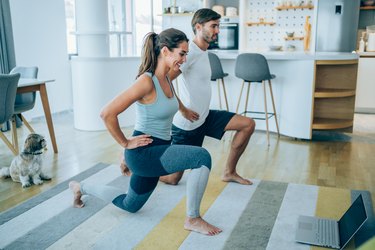
When you first start working out, it can be surprising to see the scale moving up. But know that your sudden weight gain is probably due to nothing more than water retention.
"I would not fuss over water-weight gain, as it's common and expected after a hard session," says New York-based certified personal trainer Carolina Araujo, CPT. "It's your body's way of healing and recovering."
Video of the Day
Video of the Day
Yep, water-weight gain is a totally normal and temporary part of your body's post-workout recovery process. (Also, the best measure of your fitness progress isn't the number on the scale.)
So, if you're experiencing any water retention after working out, read on to learn how temporary fluid fluctuations can actually boosts your results.
2 Main Causes of Muscle Fluid Retention
1. Temporary Inflammation
"The most common reason for slight weight increases or fluctuations after exercise is inflammation," Araujo says.
This is a natural, healthy result of working your muscles hard. As you stress your muscles, microscopic tears form in them, creating inflammation and signaling your body to start repairing so you can grow stronger and fitter than before, according to the Cleveland Clinic.
To help the recovery process, your body moves fluid to the damaged muscle cells. In turn, your muscles gobble up the H2O like the nutrient-rich workout recovery beverage it is.
2. More Glycogen in Your Muscles
As your body adapts to training and gets better at fueling its muscles, water retention can also result, according to the Cleveland Clinic.
To make sense of this, it's important to first understand that, when you work out, your body largely runs on glycogen. A form of carbohydrate that your body stores in your liver and muscles, it quickly converts to energy to power your high-intensity lifts, runs and rides.
What's this have to do with water? Well, your body stores glycogen in water. So the more glycogen your muscles have on board, the more water they'll retain. (FYI, this can also make your muscles look a bit bigger.)
When first starting workout routine, your body quickly stores more and more glycogen (and water) to help your body handle your active lifestyle. After a month or so your glycogen and water levels will likely find their new normal.
So, do sore muscles retain water? They definitely can!
After all, inflammation is a main cause of water retention, and a sore muscle is an inflamed one. Delayed onset muscle soreness, or DOMS, is an ache or tightness that occurs about 24 to 48 hours after exercise, according to the American Council on Exercise. It's a normal result of doing any exercise that's new to you, no matter how fit you are.
3 Ways to Deal With Water Weight Gain After Exercise
Water retention after a workout is a good sign your body is recovering properly from your training session. "Allow it to recover at its own rate and with all the tools that it requires: rest, hydration and nourishment," Araujo says.
1. Rest
Integrating dedicated rest and recovery days into your workout routine is an important step in making sure that your muscles have a chance to repair themselves before your next workout challenge, she says.
Active recovery workouts like stretching, yoga and walking are great ways to boost muscle repair while moving blood and H2O in and out of your tissues.
2. Hydrate
Staying well hydrated can help your muscles recover, so make sure to drink regularly during and after your workouts.
Everyone's water needs vary, but a good way to check your hydration levels is by checking your urine. If you're drinking enough water your pee should be a practically clear, light yellow color, according to the Mayo Clinic. But the darker your urine, the greater your need to drink more water.
3. Nourish
A balanced diet that focuses on whole, unprocessed foods give your muscles all of the nutrients they need to recover, Araujo says. It can also help reduce excess inflammation.
Integrate one source of carbs (whole grains, fruits, vegetables), protein (meats, dairy, soy) and fat (fatty fish, olive oil, nuts, avocado) into each meal and snack.
To guarantee the widest array of nutrients, try to make the foods on your plate as colorful as possible. Think: Pink salmon, purple potatoes and green beans.
Related Reading
Was this article helpful?
150 Characters Max
0/150
Thank you for sharing!
Thank you for your feedback!